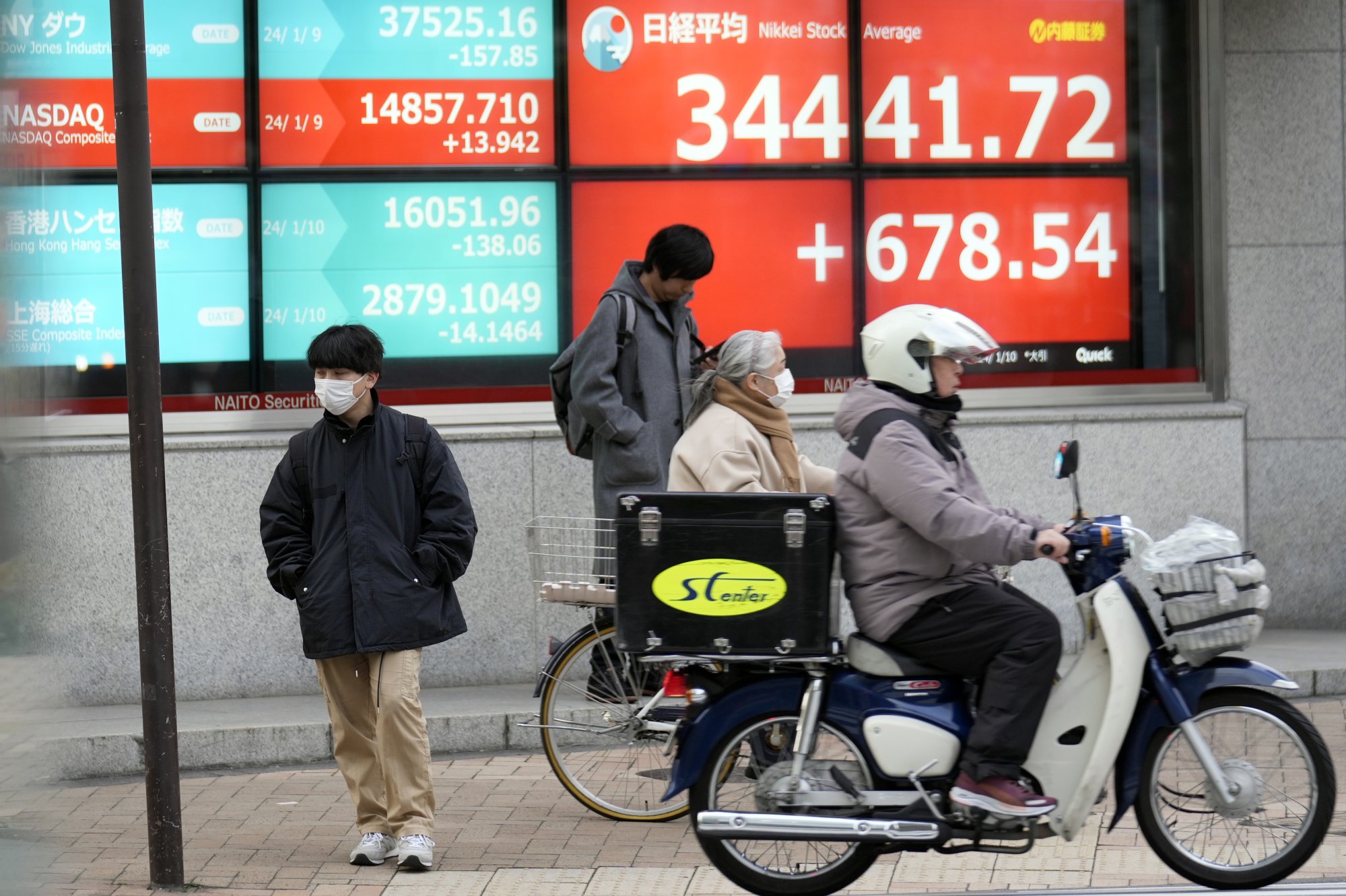Japan stocks surge to 34-year high, but rally could slow amid expected shift in monetary policy
[ad_1]
The bank has been following such a policy by holding down interest rates to encourage consumer spending. Its policy has sharply contrasted with the US Federal Reserve, which has hiked rates over the past year-and-a-half to fight inflation.
The value of the yen against the US dollar slid to 151 yen per dollar in November from 131 yen at the beginning of 2023, which “has shored up yen-denominated profits for Japanese corporations earning overseas”, said Nobuko Kobayashi, who is Ernst and Young’s Tokyo-based Asia-Pacific strategy execution leader.
Foreign investors have sought to take advantage of the difference in interest rates by scooping up stocks of Japanese companies. Strong earnings growth for Japanese equities, which have been available at attractive valuations, have amplified the trend.
Investors’ confidence in Japanese stocks has also grown with measures by companies to improve their share valuations and corporate governance. Positive signals since last year that Japan’s economy was shifting from deflation – a trend of falling prices – to inflation have also acted as a catalyst.
Room to grow
Yue Bamba, BlackRock’s head of active investments for Japan, said the economy’s shift from deflation, as well as corporate reforms, had caught the attention of global investors.
“So that’s kind of the bigger driver, the longer-term driver, and we expect that to continue well into 2024. So, we think that the rally can persist,” he said.
The outlook for Japanese corporate earnings is robust as expansion of industrial capacities, which were at all-time highs last year, is expected to grow by another 10-15 per cent in 2024, according to Bamba.
“The cyclical conditions in the Japanese economy are quite strong,” he said. “There’s something fundamentally positive that is going on in Japan, and global investors are generally excited about that.”
Bamba said global investors had been underweight on Japan in their wealth portfolio, and he believed “there’s plenty of room for capital to be reallocated to Japan”.

Jamus Lim, an associate professor of economics at the ESSEC Business School, Asia-Pacific in Singapore, said there was a sense “that the Japanese stock market – which had underperformed for more than two decades – is now deeply undervalued”.
This sentiment is being bolstered by a weak yen, which “makes foreign investment cheaper”.
However, analysts are divided over whether the rally will continue and, if so, at the same pace amid indications that the Bank of Japan may shift from its ultra loose monetary policy as early as April.
“We expect the rally to taper off. Economic growth is stuttering,” Angrick said. “The Bank of Japan is slowly but steadily dialling back monetary easing. And fiscal policy will become less supportive.
“All these factors suggest Japanese equities will tread water in the months ahead,” he added.

Policy headwinds are also looming, with the US Fed indicating it would cut interest rates this year, which is likely to be a signal to other central banks to lower their rates.
If these materialise, it would narrow the difference in rates with Japan, especially as the Bank of Japan too has been weighing a rate increase, though the timing appears to have been pushed back following the devastating earthquake in central Japan.
Analysts say it would be difficult for Japan to keep driving its economy through loose monetary policy that weakens the yen. A further slide in the yen’s value over the long run “will drive up consumer prices in import-dependent Japan, hurting household economics”, said EY’s Kobayashi.
Over the long haul, the sustainability of Japan’s stock rally would depend on whether the country could shake itself out of deflation and into inflation through wage and price increases, she said.

Market analysts are hoping that Japan’s central bank will keep its loose monetary policy in place for some more time to aid the country’s economic recovery.
There could be “some short-term breather” in the stock rally, said Yeap Jun Rong, market strategist at IG Asia, but “my view is that there is room for further gains in Japanese equities”.
The Japanese economy was expected to grow at 1 per cent this year, which would lead to “solid domestic demand”, said Tomo Kinoshita, global market strategist for Japan at Invesco.
“Due to Japan’s expected economic resilience and favourable flow of funds, I expect Japanese stocks to perform at par with US and European equities in H1 [the first half of] 2024,” Kinoshita said.
Global equities could lose momentum in the second half of the year as expectations of interest rate cuts and economic recovery have been priced in the first half, Kinoshita said. But Japanese equities are likely to outperform US and European equities because of the Asian nation’s transition to an “inflationary” economy, he added.
[ad_2]
Source link


